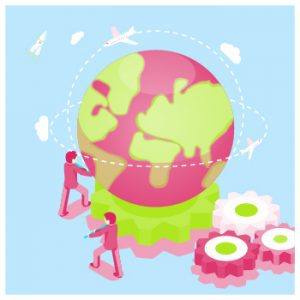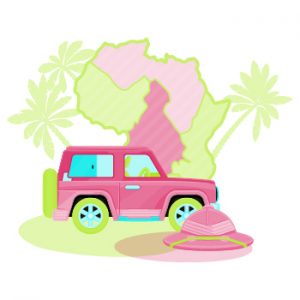
What are the Colonial Languages Spoken in Sub-Saharan Africa?
African culture and languages
We all come from different parts of the world and have distinct customs. It is human nature to be curious about other people’s lifestyles. Cultural traditions are long-standing practices of a certain group. These customs become a part of the people’s culture and identity. We recognize Chinese people by their clothing and way of life, just as they use chopsticks and dress in unusual ways. Similarly, Africa is a multi-cultural continent with a diverse range of languages and dialects.
Culture and languages are things that change through time. They can’t stay the same for a thousand years. Ancient Native Americans, for example, had diverse customs, but today’s native Americans follow the same tradition in various forms. Genetic variety also contributes to cumulative culture. Cultural diversity is not a bad thing; people’s lifestyles change with time. This occurs when people of different cultures, such as numerous British in South Australia, blend their traditions.
Even though they are from the same country, South Australia and Western Australia have different habits. The same goes for languages and dialects.


African Languages and dialects
Every language has a variety of dialects that develop as a result of many reasons. There, that specific language changes some factors, resulting in the emergence of a dialect. Language is the use of words and sounds to communicate. Dialect, on the other hand, emerges from the mutual intelligibility of a language.
Dialects come in a variety of shapes and sizes. Some dialects form as a result of regional differences, while others may emerge as a result of the mingling of different languages. The most prevalent and commonly used dialects are regional dialects. Every region has its dialect. For example, there are many dialects of English, such as Irish English, Scottish English, and British English. They all speak the same language, but they have various dialects. Even if you break these dialects further, there are still more divides based on geography and history according to their cultural backgrounds.
African languages
Many people believe they are the same, however, there is a significant difference between them. The primary distinction is that an accent is simply a manner of pronouncing something. However, dialect is a larger term that encompasses not only an accent but also vocabulary and grammar. Many things have an impact on dialects. Linguistic innovations are common changes in language and dialect. Africa is the world’s linguistically most diverse continent.
Africa is home to between 1,500 and 2,000 languages including African native languages, Niger-Congo languages, and colonial languages, their major languages. At least 75 of them have over a million listeners.
This graph exemplifies how diverse Africa’s linguistic landscape is. There are 48 mainland countries and six island nations in Africa. Given the continent’s large number of countries, it may seem odd that the continent’s languages can be divided into only four groups, although these classifications are not without disagreement.
Famous Sub Saharan African languages
Geographically, Sub-Saharan Africa is part of South Africa, south of the Sahara. It includes all African countries and territories that are wholly or partially south of the Sahara, according to the United Nations. There are around 1000 languages of Sub-Saharan Africa. Hundreds of millions of people speak Arabic, Somali, Berber, Amharic, Oromo, Igbo, Swahili, Hausa, Manding, Fulani, and Yoruba.
Twelve dialect clusters (which may group up to a hundred linguistic variants) are spoken as a first or extra language by 75 percent of Africans, and fifteen by 85 percent. Famous ancient sub-Saharan African languages are Swahili, Hausa, Amharic, and Wolof. Swahili, also known as Kiswahili, and Amharic are two of Sub-Saharan Africa’s primary languages. Swahili is a Bantu language, while Amharic is an Ethiopian language.
Bantu people are people who speak Bantu languages and are native to numerous countries in the region. While Amharic is unique to Ethiopia, Swahili, which was developed as a lingua franca for several countries in Sub-Saharan Africa, particularly in the African Great Lakes region, has extra issues in terms of localization.
Kinyarwanda is a Bantu language from Africa that is spoken in Rwanda which is an African country. Kinyarwanda and Urunyarwanda are two other names for it. As a national language, it is spoken by the whole Rwandan population throughout the country.

Most spoken Colonial (European languages) in Sub Saharan Africa
Since the colonial era, Indo-European languages such as Afrikaans, English, French, Italian, Portuguese, and Spanish have had official status in many nations and are widely spoken as lingua francas. Millions speakers use these languages to communicate, the number of English speakers is higher and after that French speakers because of colonial empires in African society. Check out this for American to Spanish translation services.
Even though African languages are spoken alongside Swahili, English, and French, they are not related in any way. Because these languages are so diametrically opposite, one would ask why they are all spoken in the same country. It’s because these countries were colonized by English and French invaders, and the locals adopted European languages and customs. Despite this, these languages continue to have a significant impact on African culture.
These colonial had a dominating effect on local languages and still long after colonists has gone, these languages are dominating African countries.

Due to the huge linguistic diversity of many African countries, Nigeria alone has 250 languages, one of the world’s largest concentrations of linguistic diversity, language policy has become a crucial concern in the post-colonial era. In recent years, African countries have become more aware of the value of their linguistic legacy. The majority of language policies being developed now are multilingual thanks to European countries. The African Union, for example, considers all African languages to be official languages (AU).
How we lost many rich cultures and languages to colonialism
Numerous reasons contribute to a language’s extinction. The main causes of language extinction are colonization and immigration. Interactions between people of different cultures harm both cultures. They take a lot of things from each other. People acquire things from the ruling class, especially during colonialism, even if they come from distinct civilizations.
The culture of neighboring countries influenced the language of native Africans. When Africans migrated to other countries, they left behind a legacy. The loss of languages is a slow and protracted process. However, the consequences are long-term. Many languages presently have fewer than 100 speakers.
In records, grammar and terminology are not reserved. Many languages have fewer than ten native speakers. And the majority of them were elderly. Young African generations did not learn their ethnic languages due to the language’s dwindling reach. They are stranded and will perish as a result. When people become more modern. They begin to learn new vocabulary and languages.
Rival of indigenous African languages
Old languages will eventually become extinct. Only a few dozen people speak out of a crowd of thousands. People who become more modern adopt modern languages. As a result, the number of people who speak their mother tongue is dwindling. Only a dozen fluent speakers remained in the end. The elderly speak a variety of African and Indian languages that the younger generation does not.
Thanks to the internet, the international community, European colonizers, and African leaders who didn’t use their political power to improve local linguistic features, that now everyone wants to speak only English. People who know English enjoy a privileged status and indigenous languages are discouraged.
To encourage national language and local dialects, classroom resources, and educational resources should be in native African languages. Instead of English studies, the study of native languages should be compulsory. In this way, the native-born population of African society will not forget its true languages. International organizations are also working to revive endangered languages with the community of educators.

Preservation of Indigenous Scripts
The preservation of indigenous scripts is a critical aspect of cultural heritage conservation in Sub-Saharan Africa. UNESCO, in collaboration with organizations like the Agence Française de Développement (AFD), has been instrumental in supporting initiatives to document and revitalize African scripts. These scripts, which are distinct from the Latin script introduced during colonial rule, represent unique linguistic and cultural identities that are integral to the region’s heritage. By promoting the use of indigenous scripts in education, literature, and media, UNESCO aims to ensure their visibility and relevance in contemporary society.
In regions like Southern Africa, where diverse indigenous scripts coexist alongside colonial languages, efforts to preserve and promote these scripts face numerous challenges. Limited resources, technological barriers, and the dominance of colonial languages pose obstacles to the revitalization of indigenous scripts. However, grassroots movements and community-led initiatives are driving momentum for script revitalization, fostering a renewed appreciation for linguistic diversity and cultural heritage. Through collaboration with local stakeholders and the integration of indigenous scripts into digital platforms, UNESCO is working to ensure that these scripts continue to be valued and preserved for future generations.
Colonial Languages Shaping African Regions
From the 15th to the 19th centuries, colonial powers established African colonies across West Africa, North Africa, Central Africa, East Africa, and Southern Africa. These powers introduced dominant languages, such as the French language, which significantly influenced the economic growth and cultural dynamics of African people. In Cape Verde and other parts of Africa, these colonial languages often belong to the same language family. The legacy of these languages continues to shape the linguistic landscape and economic development of the continent.
Historical Accuracy:
- Colonial Powers and African Colonies: European colonial powers such as Britain, France, Portugal, and Spain established colonies in various regions of Africa during the 19th century, with some initial contact and influence beginning as early as the 15th century.
- Regions Affected: Colonization affected all mentioned regions: West Africa, North Africa, Central Africa, East Africa, and Southern Africa.
- Dominant Languages Introduced: The colonial period introduced several European languages to Africa, with French being particularly dominant in West and Central Africa.
- Impact on Economic Growth and Cultural Dynamics: The introduction of these languages did influence economic and cultural aspects, often favoring colonial economies and creating new socio-cultural dynamics.
- Cape Verde: Cape Verde, a former Portuguese colony, primarily speaks Portuguese, not French. This part of the paragraph may need correction.
- Language Family: The term “language family” is broad, but European colonial languages (e.g., Romance languages like French and Portuguese) are part of the Indo-European family, which differs from the various African language families.
- Legacy: The legacy of colonial languages indeed continues to influence modern African nations, affecting education, administration, and international relations.
Development Initiatives: AFD & UNESCO
The Agence Française de Développement (AFD) and UNESCO have been pivotal in promoting linguistic diversity and cultural heritage preservation in Sub-Saharan Africa. Recognizing the importance of indigenous languages in shaping identities and fostering inclusive development, these organizations have collaborated on numerous projects aimed at language revitalization and preservation. Through funding and capacity-building initiatives, they have supported local communities in documenting endangered languages, promoting multilingual education, and integrating linguistic diversity into sustainable development strategies.
In regions like Eastern Sudanic and Central Sudanic, where linguistic diversity is particularly rich, AFD and UNESCO have played a crucial role in safeguarding endangered languages and promoting linguistic rights. By providing technical expertise and financial support, they have empowered local communities to revitalize their languages and preserve traditional knowledge systems. Moreover, their efforts extend beyond language preservation to include the promotion of sub-Saharan African music, oral traditions, and cultural expressions, contributing to the vibrant tapestry of African heritage.
Language Policy and Education
Language policy and education play a pivotal role in shaping the linguistic landscape of Sub-Saharan Africa and fostering socio-economic development. In countries like Ivory Coast, where linguistic diversity is a defining feature, language policies have a profound impact on education, governance, and social cohesion. UNESCO’s advocacy for multilingual education has led to significant strides in promoting linguistic diversity and ensuring equitable access to quality education for all.
However, challenges persist in areas where colonial languages remain dominant, often overshadowing indigenous languages and marginalizing linguistic minorities. Efforts to promote indigenous languages as the language of instruction face resistance in some regions, particularly in Southern Africa, where colonial legacies continue to influence educational systems. Despite these challenges, initiatives to promote mother-tongue education and preserve linguistic diversity are gaining momentum, driven by grassroots movements and international partnerships.
Cultural Heritage and Linguistic Diversity
Cultural heritage and linguistic diversity are intrinsically linked, forming the bedrock of identity and social cohesion in Sub-Saharan Africa. UNESCO’s commitment to safeguarding intangible cultural heritage, including languages, reflects the recognition of the vital role that linguistic diversity plays in preserving cultural identities and promoting sustainable development. In regions like Northern Africa, where the convergence of diverse linguistic and cultural traditions is evident, UNESCO’s efforts to promote intercultural dialogue and heritage preservation are paramount.
The adoption of the Latin script for writing indigenous languages has facilitated their documentation and dissemination, contributing to the revitalization of endangered languages and the promotion of linguistic rights. Moreover, initiatives to integrate indigenous languages into official discourse and public life have empowered linguistic minorities and fostered a sense of belonging and inclusion. As Sub-Saharan Africa continues to navigate the complex interplay between globalization and cultural identity, UNESCO’s advocacy for linguistic diversity remains crucial in safeguarding the region’s rich tapestry of languages and cultures.
Economic Empowerment and Linguistic Diversity
Economic empowerment and linguistic diversity are intertwined in Sub-Saharan Africa, where language plays a crucial role in shaping economic opportunities and social mobility. The promotion of indigenous languages in economic sectors such as tourism, commerce, and media has the potential to unlock new opportunities for local communities and promote inclusive growth. In countries like Ivory Coast, where Austronesian languages coexist with colonial languages, initiatives to harness linguistic diversity for economic development are gaining momentum.
Moreover, the recognition of indigenous languages as a valuable asset for innovation and creativity is reshaping perceptions of linguistic diversity in the region. By fostering entrepreneurship and cultural entrepreneurship in local languages, organizations like AFD and UNESCO are empowering communities to leverage their linguistic heritage for sustainable development. However, challenges such as the dominance of colonial languages in formal economic sectors and limited access to resources for language revitalization remain barriers to unlocking the full potential of linguistic diversity for economic empowerment.
Cultural Fusion: Music and Language
Sub-Saharan music serves as a vibrant reflection of the region’s linguistic and cultural diversity, with influences from indigenous traditions, colonial legacies, and global music trends. In Southern Africa, where a mosaic of languages and cultures coexist, music has long been a powerful vehicle for cross-cultural exchange and artistic expression. From traditional drumming and vocal styles to contemporary genres like Afrobeat and Kwaito, Southern African music embodies the rich tapestry of linguistic and musical heritage found across the region.
Moreover, the Arabic language has also left its mark on Southern African music, particularly in regions with historical ties to the Arab world. Through trade routes and cultural exchange, Arabic influences have permeated musical styles and instrumentation, contributing to the unique fusion of sounds found in Southern African music. Whether in the rhythms of the djembe or the melodies of the mbira, traces of Arabic musical traditions can be heard, illustrating the interconnectedness of language, culture, and music in the region’s artistic landscape.
Frequently Asked Questions
What are the main colonial languages spoken in Sub-Saharan Africa?
The main colonial languages spoken in Sub-Saharan Africa are English, French, Portuguese, and to a lesser extent, Spanish. These languages were introduced during the colonial period and continue to play significant roles in government, education, and commerce.
How did these colonial languages become so prevalent in Sub-Saharan Africa?
Colonial languages became prevalent due to the colonization of African territories by European powers in the 19th and early 20th centuries. European colonizers established these languages as the official languages of administration, education, and trade. After gaining independence, many African nations retained these languages for practical reasons, such as unifying diverse linguistic groups and facilitating international communication.
Which countries in Sub-Saharan Africa primarily speak English as a colonial language?
Countries in Sub-Saharan Africa where English is a primary colonial language include Nigeria, Kenya, Uganda, Ghana, Tanzania, and South Africa, among others. These countries were former British colonies or territories and have retained English as an official language.
In which Sub-Saharan African countries are French widely spoken?
French is widely spoken in many Sub-Saharan African countries, including Senegal, Ivory Coast, Cameroon, the Democratic Republic of Congo, Mali, and Niger. These countries were former French colonies or territories and continued to use French as an official language.
What role do colonial languages play in contemporary Sub-Saharan Africa?
In contemporary Sub-Saharan Africa, colonial languages serve several important functions. They are often used as official languages in government and legal systems, as languages of instruction in education, and as common languages in business and international diplomacy. These languages help bridge communication across diverse ethnic groups and play a key role in the integration of African countries into the global economy.
